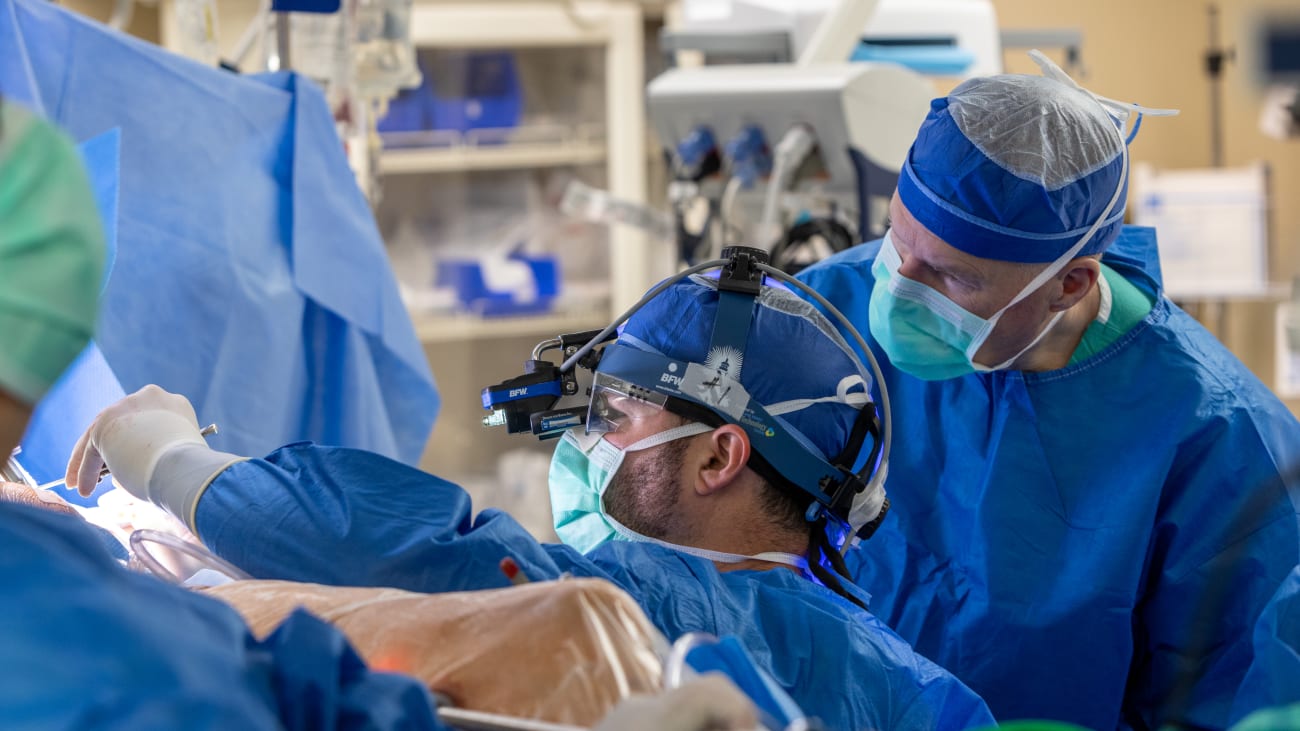

When Edgar Jones stumbled, alone, into the emergency room at Baptist Health Fishermen’s Community Hospital, he already knew what was wrong. “STEMI” was the only word he managed to blurt out to the receptionist, who sprang into action and caught him as he collapsed.
STEMI stands for ST-segment elevation myocardial infarction, a severe type of heart attack in which a blockage in a coronary artery either completely or nearly completely cuts off blood flow to the heart.

Edgar Jones
Once he was stabilized with medication, Mr. Jones was driven by ambulance for treatment at Baptist Health Miami Cardiac & Vascular Institute. But the news from the imaging he underwent was not good.
“They looked at my heart using contrast, and they said, ‘You need a triple bypass,’” he says. “I was terrified at first. I didn’t know if I would survive it. My dad and my uncle went through a lot when they had bypass surgery. It was a lot of rib-cracking and a lot of pain and suffering. I said, well, I certainly don’t want to have that happen to me.”

Joseph McGinn Jr., M.D., chief of cardiac surgery at Baptist Health Miami Cardiac & Vascular Institute
A Better Alternative to Open Heart Surgery
Mr. Jones, 65, is no stranger to heart disease. He survived his first heart attack right after Hurricane Irma after being transported by helicopter for emergency treatment at Baptist Hospital. At the time, Fishermen’s Community Hospital, which was severely damaged in the 2017 storm, was still functioning out of tents and a mobile hospital unit in order to serve the community.
By the time of his more recent cardiac event earlier this year, Fishermen’s was well-established in a beautiful new building constructed with the community’s help. As a long-time resident of the close-knit Middle Keys, Mr. Jones is grateful to the staff, some of whom he has known personally for years, for saving his life a second time. But he knew he would require more advanced treatment again in Miami.
His brother, who has a background in medical research, helped advise him. “He said to tell the doctor to please advocate for the least invasive surgery,” Mr. Jones says. “I didn’t know there were better alternatives.”
Among the options offered to Mr. Jones was minimally invasive bypass surgery, which was pioneered by Joseph McGinn Jr., M.D., chief of cardiac surgery at Miami Cardiac & Vascular Institute. Dr. McGinn is internationally renowned for designing a technique that allows bypass surgery to be performed through a small incision between the ribs without having to open a person’s chest, split the ribs or stop the heart. “I told them I would love to do that if I’m a candidate for it,” Mr. Jones recalls.
Being in the Right Place at the Right Time
Because it requires expert training and highly specialized instruments, only a handful of hospitals in the United States offer the minimally invasive approach to cardiac bypass surgery, known internationally as the McGinn Technique. Even fewer make it available for patients who require a bypass on multiple arteries.
In South Florida, the surgery is undertaken almost daily by Dr. McGinn and his son, Joseph McGinn III, M.D., a cardiac surgeon who operates at Baptist Hospital, Boca Raton Regional Hospital and Bethesda Hospital East, all part of Baptist Health.

Joseph McGinn III, M.D., a cardiac surgeon with Baptist Health Heart & Vascular Care
The technique, which is performed on the beating heart, dramatically reduces pain, blood loss and the time it takes for patients to recover. Most people return to their regular routines in less than two weeks, as opposed to the many months it takes to recuperate from open heart procedures.
As part of Baptist Health Heart & Vascular Care, the father-and-son McGinn team have worked on honing every aspect of the minimally invasive coronary artery bypass graft surgery, also known as MICS CABG (Minimally Invasive Cardiac Surgery Coronary Artery Bypass Grafting). This includes redesigning instruments and adjusting their approach in order to trim the time patients are under anesthesia.
“Baptist Health has been very supportive of us, and the proof is in the results,” says the younger Dr. McGinn, who operated on Mr. Jones. “He went home four days after surgery with no broken bones, no sternal precautions. I’ve had patients like him who are playing golf two weeks after surgery. I’ve had patients who are breadwinners for their family, like the 46-year-old nurse who was a single mother. She was back to work in about two weeks.”
Dr. McGinn notes the surgery is also a good option for patients who might have wound-healing issues, higher infection risk or other frailty, such as cancer patients, diabetics and elderly people.
A Rare Approach to Triple Bypass
For anyone who has seen a loved one go through traditional bypass surgery, a procedure with little pain may seem inconceivable but it is possible. “You just go through the side, spread the ribs—you don’t break the ribs—and you get the procedure done,” Dr. McGinn says. “It’s really a great procedure for many people.”
A minimally invasive approach to a triple bypass, in which blockages in three of the four cardiac arteries are addressed, is exceedingly rare. It is accomplished by using slings, sutures and specialized suction cups to access the arteries by shifting the heart out of the way without opening the chest, Dr. McGinn says.
Only about 20 surgeons internationally have performed a minimally invasive triple bypass in this fashion, with perhaps only a half-dozen in the United States, Dr. McGinn says. He shares the credit with his father for pioneering the procedure, in addition to the outstanding team he works with at Baptist Health. “You have to have great skill and attention to detail from every person in the operating room, from the scrub tech to the assistant, to the anesthesiologist, to the perfusionist. The whole team is excellent.”
Mr. Jones is deeply grateful to Dr. McGinn and his assistants for their skill, as well as for their kindness, confidence, willingness to listen and sense of humor. “Aside from the seriousness of it, it was actually a breeze,” he says. “My recovery was amazing—within a week I felt normal. I feel better than I’ve felt in probably 10 years.”
A Happy Result
Mr. Jones says he quickly resumed his normal activities of fishing, boating, landscape work and more. He participated in a 12-week cardiac rehab program at Baptist Health Mariners Hospital and “they cleared me to do anything I want.”
In contrast, he says, a close friend who underwent traditional open-chest bypass surgery elsewhere a week after him was still dealing with considerable pain and fragility three or four months later. For Mr. Jones, it drove home the reality of how much pain he was spared.
Normally, Mr. Jones spends the spring and summer in Tennessee, “but I was busy having a heart attack and bypass surgery,” he says, only half-joking. This year, he wasn’t able to go until July—but by then he says was fully recovered and able to do property maintenance on the family home.
“My friend Alex is helping me. We took out all the shrubs, and they were 15 feet tall. We pulled them out and cut them up. We pressure-washed the house, repainted the house,” he says. “I can do everything like when I was 25. That’s the one thing you could tell people about Baptist Health: If you go through all of their programs they will get you strong again, like when you were 20, 25, 30 years old. That’s what happened to me.”

